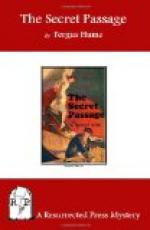Mrs. Octagon was very literary. She had published several novels under the nom-de-plume of “Rowena.” She had produced a volume of poems; she had written a play which had been produced at a matinee; and finally her pamphlets on political questions stamped her, in the opinion of her immediate circle, as a William Pitt in petticoats. She looked upon herself as the George Eliot of the twentieth century, and dated events from the time of her first success. “That happened before I became famous,” she would say. “No, it was after I took the public by storm.” And her immediate circle, who appreciated her cakes and ale, would agree with everything she said. The Kensington house was called “The Shrine of the Muses!” and this title was stamped on her envelopes and writing-paper, to the bewilderment of illiterate postmen. It sounded like the name of a public-house to them.
Peter was quite lost in the blaze of his wife’s literary glory. He was a plain, homely, small man, as meek as a rabbit, fond of his garden and fireside, and nervous in society. Had he not committed the fatal mistake of wedding Mrs. Saxon, he would have taken a cottage in the country and cultivated flowers. As it was, he dwelt in town and was ordered to escort Mrs. Octagon when she chose to “blaze,” as she put it, in her friends’ houses. Also there was a reception every Friday when literary London gathered round “Rowena,” and lamented the decline of Art. These people had never done anything to speak of, none of them were famous in any wide sense, but they talked of art with a big “A,” though what they meant was not clear even to themselves. So far as could be ascertained Art, with a big “A,” was concerned with something which did not sell, save to a select circle. Mrs. Octagon’s circle would have shuddered collectively and individually at the idea of writing anything interesting, likely to be enjoyed by the toilers of modern days. Whatever pictures, songs, books or plays were written by anyone who did not belong to “The Circle,” these were considered “pretty, but not Tart!” Anything successful was pronounced “Vulgar!” To be artistic in Mrs. Octagon’s sense, a work had to possess obscurity, it had to be printed on the finest paper with selected type, and it had to be sold at a prohibitive price. In this way “Rowena” had produced her works, and her name was not known beyond her small coterie. All the same, she intimated that her renown was world-wide and that her fame would be commensurate with the existence of the Anglo-Saxon race. Mrs. Lee Hunter in the Pickwick Papers, also labored under the same delusion.




